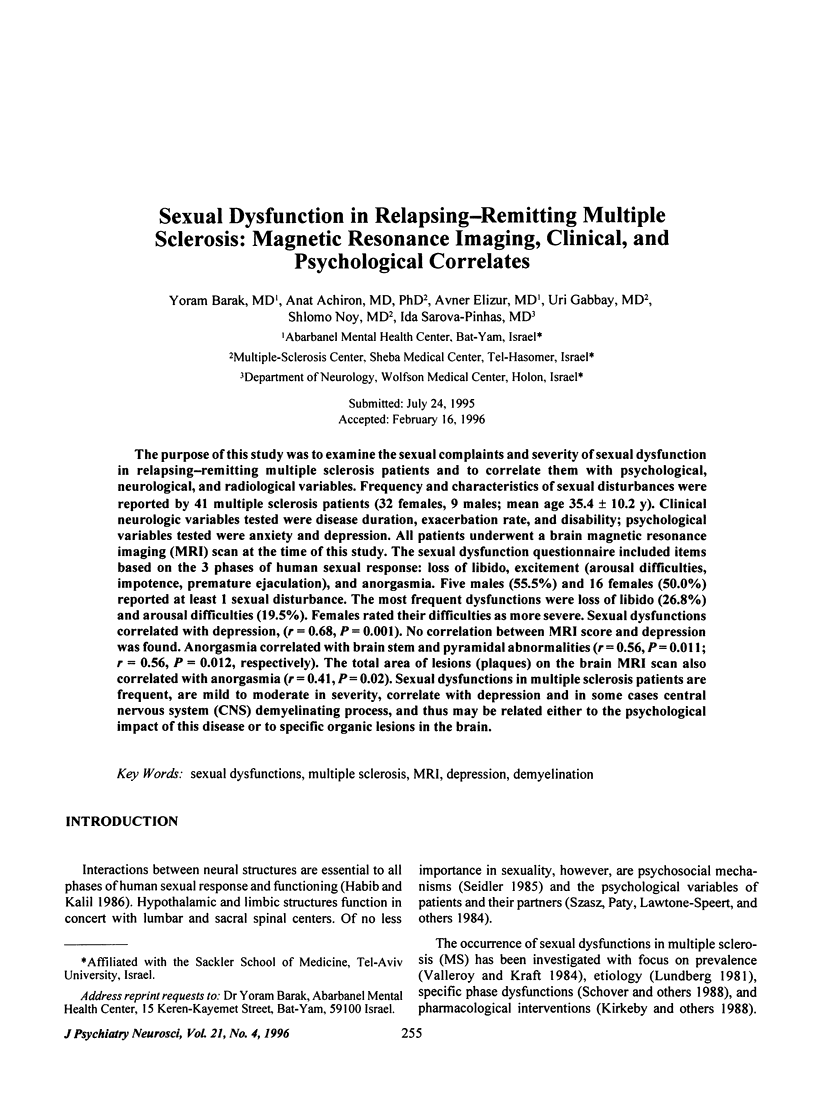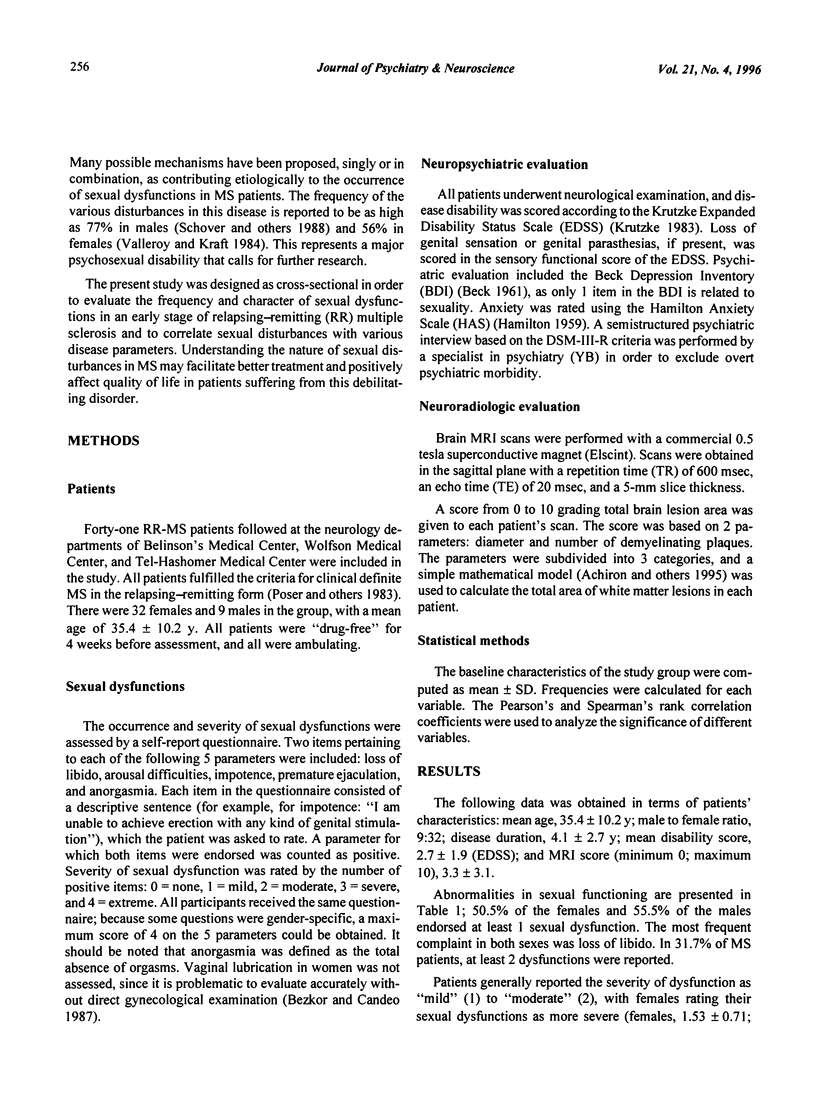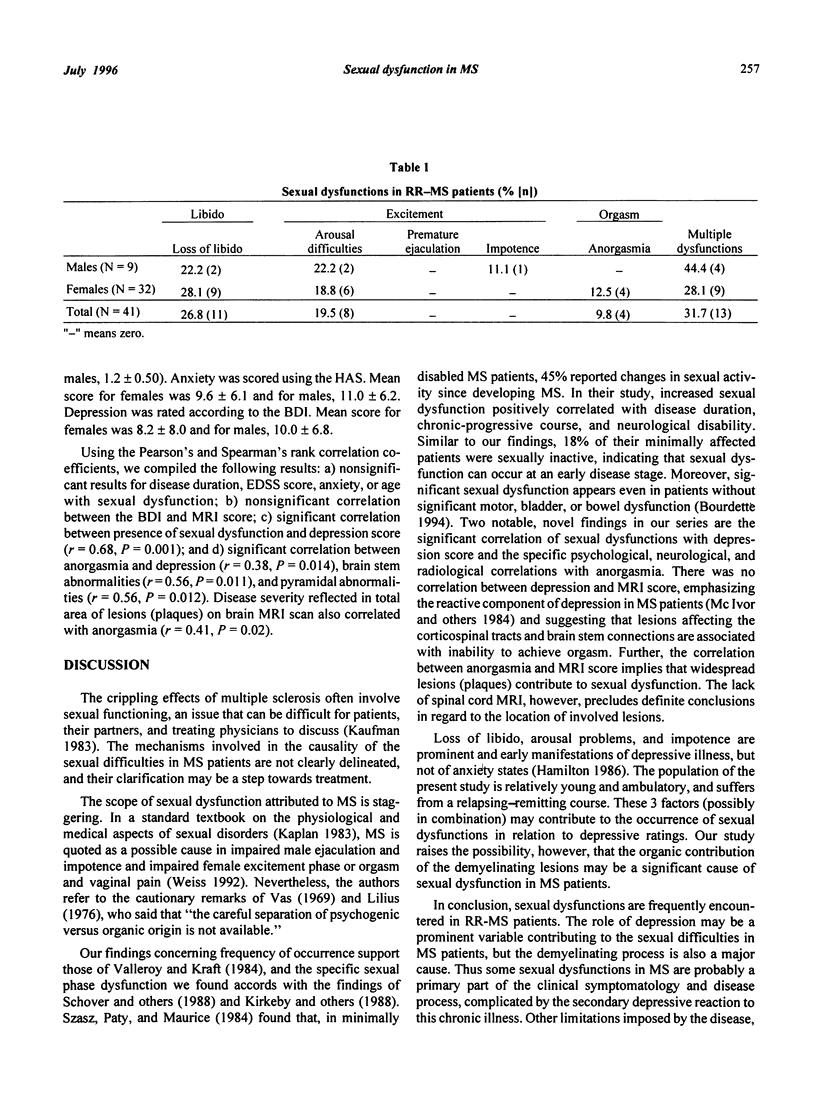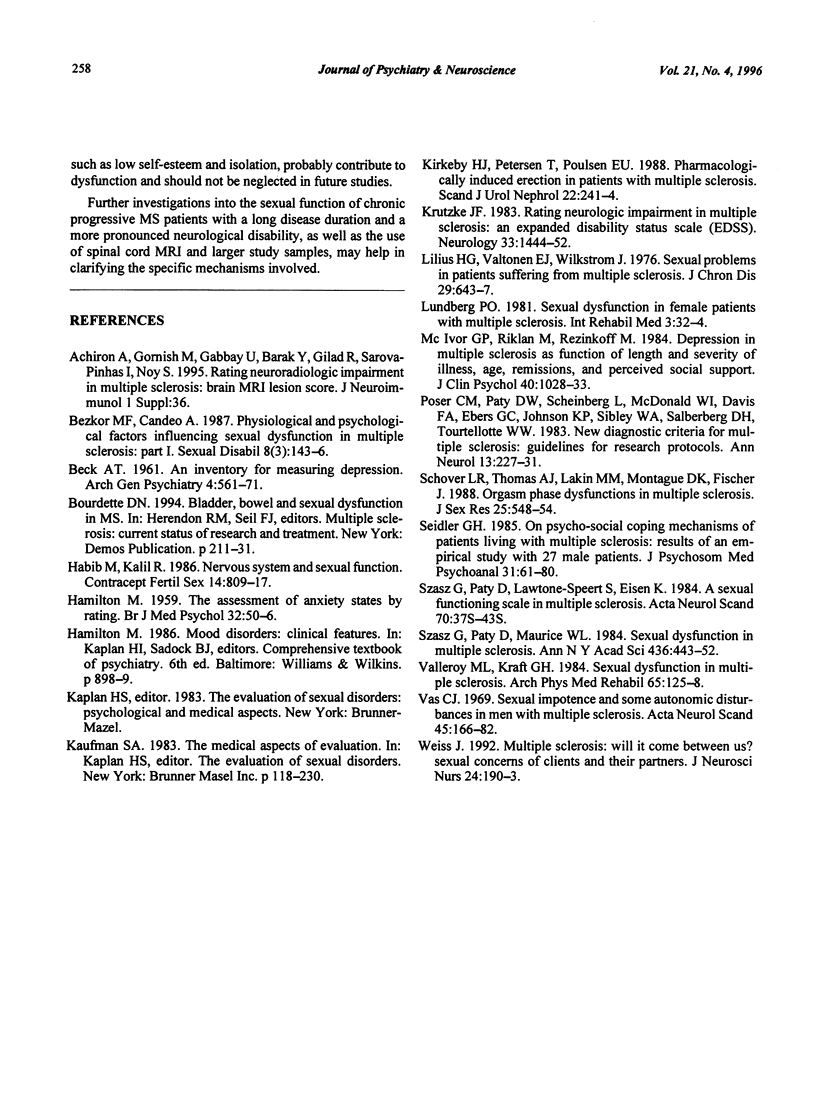Abstract
The purpose of this study was to examine the sexual complaints and severity of sexual dysfunction in relapsing-remitting multiple sclerosis patients and to correlate them with psychological, neurological, and radiological variables. Frequency and characteristics of sexual disturbances were reported by 41 multiple sclerosis patients (32 females, 9 males; mean age 35.4 +/- 10.2 y). Clinical neurologic variables tested were disease duration, exacerbation rate, and disability; psychological variables tested were anxiety and depression. All patients underwent a brain magnetic resonance imaging (MRI) scan at the time of this study. The sexual dysfunction questionnaire included items based on the 3 phases of human sexual response: loss of libido, excitement (arousal difficulties, impotence, premature ejaculation), and anorgasmia. Five males (55.5%) and 16 females (50.0%) reported at least 1 sexual disturbance. The most frequent dysfunctions were loss of libido (26.8%) and arousal difficulties (19.5%). Females rated their difficulties as more severe. Sexual dysfunctions correlated with depression, (r = 0.68, P = 0.001). No correlation between MRI score and depression was found. Anorgasmia correlated with brain stem and pyramidal abnormalities (r = 0.56, P = 0.011; r = 0.56, P = 0.012, respectively). The total area of lesions (plaques) on the brain MRI scan also correlated with anorgasmia (r = 0.41, P = 0.02). Sexual dysfunctions in multiple sclerosis patients are frequent, are mild to moderate in severity, correlate with depression and in some cases central nervous system (CNS) demyelinating process, and thus may be related either to the psychological impact of this disease or to specific organic lesions in the brain.
Full text
PDF



Selected References
These references are in PubMed. This may not be the complete list of references from this article.
- BECK A. T., WARD C. H., MENDELSON M., MOCK J., ERBAUGH J. An inventory for measuring depression. Arch Gen Psychiatry. 1961 Jun;4:561–571. doi: 10.1001/archpsyc.1961.01710120031004. [DOI] [PubMed] [Google Scholar]
- HAMILTON M. The assessment of anxiety states by rating. Br J Med Psychol. 1959;32(1):50–55. doi: 10.1111/j.2044-8341.1959.tb00467.x. [DOI] [PubMed] [Google Scholar]
- Kirkeby H. J., Petersen T., Poulsen E. U. Pharmacologically induced erection in patients with multiple sclerosis. Scand J Urol Nephrol. 1988;22(4):241–244. doi: 10.3109/00365598809180793. [DOI] [PubMed] [Google Scholar]
- Kurtzke J. F. Rating neurologic impairment in multiple sclerosis: an expanded disability status scale (EDSS). Neurology. 1983 Nov;33(11):1444–1452. doi: 10.1212/wnl.33.11.1444. [DOI] [PubMed] [Google Scholar]
- Lilius H. G., Valtonen E. J., Wikström J. Sexual problems in patients suffering from multiple sclerosis. J Chronic Dis. 1976 Oct;29(10):643–647. doi: 10.1016/0021-9681(76)90021-7. [DOI] [PubMed] [Google Scholar]
- Lundberg P. O. Sexual dysfunction in female patients with multiple sclerosis. Int Rehabil Med. 1981;3(1):32–34. doi: 10.3109/03790798109167112. [DOI] [PubMed] [Google Scholar]
- McIvor G. P., Riklan M., Reznikoff M. Depression in multiple sclerosis as a function of length and severity of illness, age, remissions, and perceived social support. J Clin Psychol. 1984 Jul;40(4):1028–1033. doi: 10.1002/1097-4679(198407)40:4<1028::aid-jclp2270400427>3.0.co;2-1. [DOI] [PubMed] [Google Scholar]
- Poser C. M., Paty D. W., Scheinberg L., McDonald W. I., Davis F. A., Ebers G. C., Johnson K. P., Sibley W. A., Silberberg D. H., Tourtellotte W. W. New diagnostic criteria for multiple sclerosis: guidelines for research protocols. Ann Neurol. 1983 Mar;13(3):227–231. doi: 10.1002/ana.410130302. [DOI] [PubMed] [Google Scholar]
- Seidler G. H. Die psychosoziale Verarbeitung einer Erkrankung an Multipler Sklerose. Ergebnisse einer empirischen Untersuchung an 27 Männern. Z Psychosom Med Psychoanal. 1985;31(1):61–80. [PubMed] [Google Scholar]
- Szasz G., Paty D., Maurice W. L. Sexual dysfunctions in multiple sclerosis. Ann N Y Acad Sci. 1984;436:443–452. doi: 10.1111/j.1749-6632.1984.tb14817.x. [DOI] [PubMed] [Google Scholar]
- Valleroy M. L., Kraft G. H. Sexual dysfunction in multiple sclerosis. Arch Phys Med Rehabil. 1984 Mar;65(3):125–128. [PubMed] [Google Scholar]
- Vas C. J. Sexual impotence and some autonomic disturbances in men with multiple sclerosis. Acta Neurol Scand. 1969;45(2):166–182. doi: 10.1111/j.1600-0404.1969.tb01230.x. [DOI] [PubMed] [Google Scholar]
- Weiss J. Multiple sclerosis: will it come between us? Sexual concerns of clients and their partners. J Neurosci Nurs. 1992 Aug;24(4):190–193. doi: 10.1097/01376517-199208000-00004. [DOI] [PubMed] [Google Scholar]


